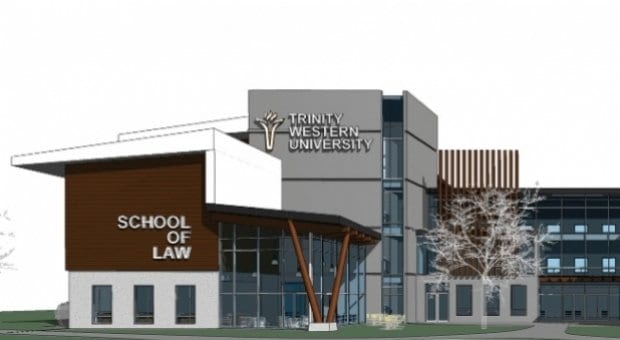Directors of Ontario’s law society have voted to refuse future Trinity Western University law-school graduates admittance to their province’s legal association. Meanwhile, BC’s legal regulator is preparing to hold a special general meeting to revisit its April 11 decision to accept the graduates, after a groundswell of opposition from lawyers.
Ontario’s regulator, the Law Society of Upper Canada (LSUC), debated the issue for two days before a nail-biting 28 to 21 vote on April 24.
The next day, Nova Scotia’s law society voted 10-9 to conditionally accept TWU law graduates to their association, provided the school amends the discriminatory portion of its covenant, or allows students to opt out.
For admission to TWU, students must sign a covenant agreeing to follow Christian biblical teachings, including no premarital sex and no homosexuality. Failure to uphold these commitments, according to the student handbook, could result in discipline, dismissal or a refusal to readmit a student to the university.
LSUC chair Thomas Conway says the decision was a difficult one. “Benchers [law society directors] took this issue very seriously and did not find it easy to reach a decision,” he says. “As members of the legal profession, we recognize the entrenched values of Canada’s Charter of Rights and Freedoms and Ontario’s Human Rights Code, including the right of equality and the right to freedom of religion, and the foundational nature of those rights to our democracy.”
He says the care in deliberation was reflected in the vote. “In our deliberations, I believe it was clear that we listened carefully to the full diversity of views and came to a decision only after a full consideration of the challenging issues raised by the TWU application,” he says. “Concerns were expressed about the discriminatory effect of TWU’s Community Covenant. I hope that these concerns can be explored further through continuing dialogue with the interested parties.”
LSUC bencher Linda Rothstein told the meeting that TWU has the right to rely on freedom of religion and that the university must be accommodated. But, she says, it is hypocritical to complain that those opposing accreditation are religiously intolerant while TWU opposes student behaviour “that is integral to their humanity.”
Like a majority of BC law society benchers, LSUC bencher John Callaghan pointed to the Supreme Court of Canada’s 2001 ruling on TWU as still binding. In 2001, the court upheld TWU’s right to teach Christian values to would-be teachers and to insist that incoming students sign its covenant. The court found that graduates of TWU’s teacher-education program are entitled to hold “sexist, racist or homophobic beliefs” as long as they don’t act on them in the public school classrooms to which they might be assigned.
“If we are going to live in a rule of law where precedent matters, we have to look to the Supreme Court of Canada,” Callaghan says.
TWU president Bob Kuhn was travelling back to BC from the LSUC meeting and was unavailable for comment.
As Ontario benchers voted, BC benchers agreed to call a special general meeting after receiving 1,300 requests from society members to revisit its decision to accept TWU graduates to the bar. Victoria lawyer Michael Mulligan circulated the petition. In an April 16 letter, he said granting approval to an institution founded on an offensive and discriminatory policy won’t improve the standard of practice of lawyers in the province.
Mulligan says he needed the support of five percent of BC’s 13,114 lawyers (or 656 signatures) to trigger the special meeting. As of April 24, LSBC spokesperson Ryan Lee says 1,300 signatures were received, of which 1,249 — or 9.5 percent — were accepted as valid.
Mulligan says the overwhelming majority of people who contacted him have been supportive. “It’s been great to see,” he says. “No doubt there will be organized opposition, but if we manage to get people out to the meeting, I’d expect that the resolution will pass.”
Lee says the LSBC is compelled to hold a meeting within 60 days of the request. “We haven’t ironed out the details,” he says.

 Why you can trust Xtra
Why you can trust Xtra


